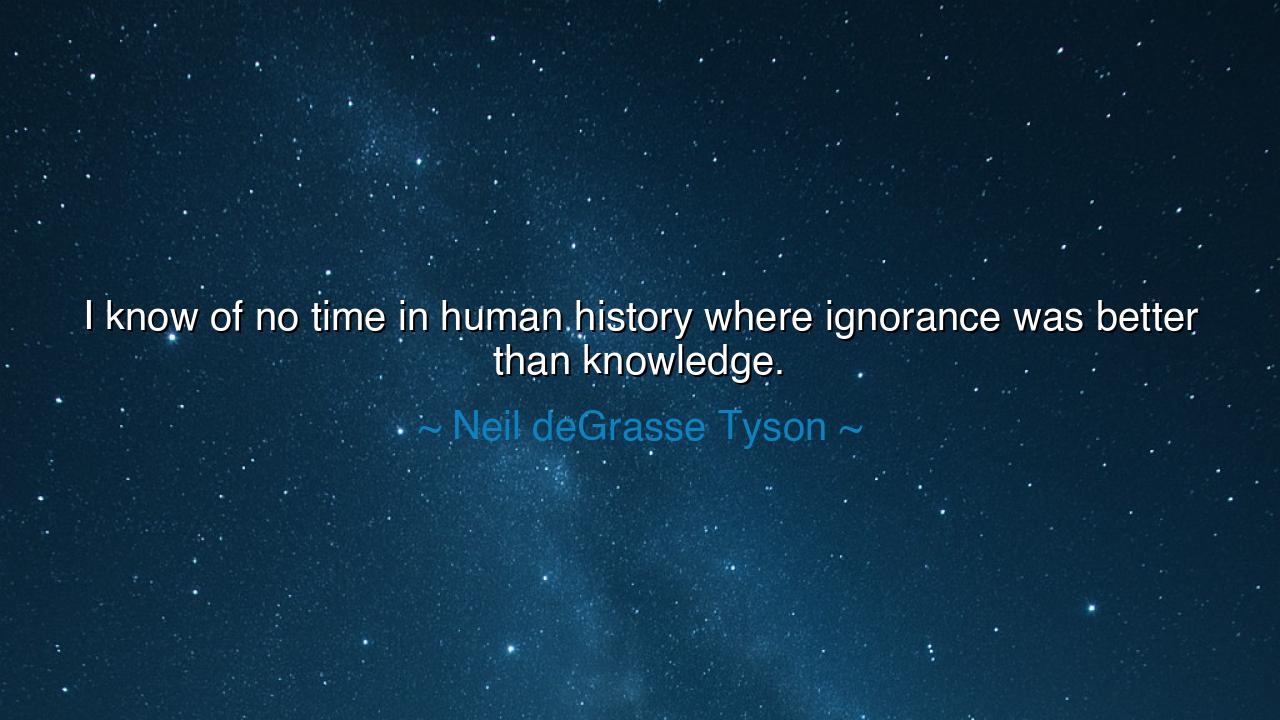
I know of no time in human history where ignorance was better






The great astrophysicist Neil deGrasse Tyson, a voice of reason in an age of noise, once declared: “I know of no time in human history where ignorance was better than knowledge.” In this simple yet resounding truth lies the heartbeat of civilization itself — the eternal struggle between light and shadow, between the humble pursuit of understanding and the comfortable slumber of ignorance. His words ring not only as a statement of fact but as a warning to those who would choose the ease of blindness over the challenge of sight. For from the dawn of humankind, every step forward has been lit by knowledge, and every age of darkness has come when that flame was despised or forgotten.
To comprehend the depth of Tyson’s words, we must look back upon the long scroll of history. In every era, progress has been born of curiosity — the courage to ask, “Why?” and “What if?” When humankind first tamed fire, it was knowledge that conquered the cold and the beast. When sailors crossed uncharted seas, it was knowledge that turned fear into discovery. When healers learned to mend the wounded, it was knowledge that turned death into life. Yet always, there were voices that feared this power, that clung to the comfort of not knowing. And always, ignorance demanded obedience, while knowledge called for freedom. Tyson’s quote stands as a defiance against that ancient fear — a reminder that no good has ever come from the worship of ignorance.
Consider the tale of Galileo Galilei, who dared to look to the heavens and proclaim that Earth was not the center of all things. For this act of knowledge, he was condemned by those who found comfort in their unchallenged beliefs. Yet though his body was silenced, his truth could not be chained. The planets still circled the sun; the stars still burned with the same light of understanding. Galileo’s story is one among many that reveal the cost of knowledge — and yet, even when knowledge brings conflict, it still leads to progress, for ignorance offers only stagnation. The wise may suffer in their pursuit of truth, but the ignorant perish by avoiding it.
There is a deep moral power in Tyson’s declaration. For it speaks not only of science, but of the human condition itself. In every heart there dwells a choice — to remain still, content in falsehood, or to seek truth, even when it demands transformation. Knowledge humbles, for it reveals how small we are amid the vastness of the cosmos. Yet in that humility lies greatness: the realization that to learn is to grow, and to grow is to honor the spark of creation within us. Ignorance builds walls; knowledge builds bridges. Ignorance fears difference; knowledge understands it. Thus, the path of wisdom is also the path of peace.
And yet, Tyson’s words are not an accusation but an invitation. He calls not for scorn of the ignorant, but for the awakening of the mind. For ignorance is not evil when it is born of innocence — only when it becomes a chosen blindness. The farmer who has never seen a star chart is not lesser than the astronomer; but the one who refuses to learn, who mocks inquiry and glorifies simplicity as virtue, is the true enemy of progress. The philosopher of old, Socrates, once said that the only true wisdom is knowing that you know nothing — not to remain in ignorance, but to hunger always for understanding. It is this humility that Tyson champions: the courage to seek, to question, to never cease learning.
Think also of the plague years of Europe, when ignorance bred fear and superstition ruled over medicine. It was knowledge, slow and hard-won, that banished disease and prolonged human life. Think of the modern age, when science and reason lift millions from poverty, heal the wounded, and reveal the mysteries of the universe. Every discovery — from the law of gravity to the decoding of the human genome — was an act of rebellion against ignorance. And though knowledge often brings disruption, it also brings liberation. The cost of ignorance, by contrast, is always higher: suffering, injustice, decay.
So let the lesson be clear, as Tyson’s words echo across the generations: Seek knowledge, and never fear it. Do not bow before those who would tell you that questions are dangerous or that wonder is wasteful. Read, listen, and learn — not only from books and teachers, but from life itself, from the stars, from the failures and triumphs of humankind. Let your mind be restless and your heart courageous, for ignorance is the comfort of the idle, but knowledge is the crown of the free.
And in the end, remember this: every time we choose understanding over fear, curiosity over complacency, and truth over comfort, we push back the darkness of ignorance just a little further. In that endless battle between shadow and light, stand always with the seekers — for as Tyson reminds us, there has never been, and never will be, a time when ignorance was better than knowledge.






AAdministratorAdministrator
Welcome, honored guests. Please leave a comment, we will respond soon